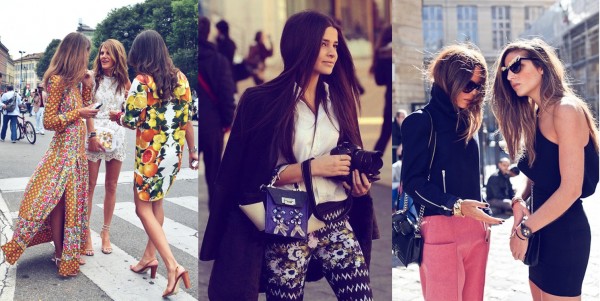Why is feminism such a dirty word? It has become synonymous with something like “man-hating, anti-housewife, dirty-hippie.” More and more girls are steering clear of any association with this title. Think of the way Taylor Swift alluded to not being interested in female empowerment in a recent interview, or the way Katy Perry, while accepting her Billboard Woman of the Year Award, was careful to point out that she’s “not a feminist.” At it’s heart, feminism is basically about equal opportunities for women. What’s so bad about that? The more you think about it, the more it seems like feminism is essentially a text-book branding disaster. Consider the images below. Really consider them.

For some mysterious reason it seems contradictory for a girl to be really into fashion (like the beautiful ladies above) AND into feminism at the same time. The two seem mutually exclusive. It’s a social undercurrent many of us aren’t even conscious of: The belief that there is a contradiction to being an intelligent & socially conscious woman, who also cares about looking fabulously, unapologetically fashionable.
Just imagine for a second that there is an imposing feminist standing on a stage delivering a passionate speech. In your imagination you can see her assertive gestures, and hear her authoritative tone. Slowly a picture of her develops in your mind. Now what if I told you that her hair is a perfect ombre cascade of waves, she has decaled the shit out of her nails and her body is absolutely dripping in designer. Chances are pretty high that is not the dread-locked, bra-burning feminist you had imagined. Why?
Well, in part because from the earliest days of consumer fashion, women were often presented as objectified and passive consumers of style. Written between the lines was the uncomfortable message that following fashion made you a sheep. But to be fair the fashion industry wasn’t responsible for creating that perception; it was broader society that carefully, if unconsciously created that image of the stylish woman.

These days, the majority of mature, intelligent fashion-loving women can differentiate between the theatre of the catwalk and real life. We have the ability to realize that the women (and men for that matter) who model clothes are going to be picked for having an exceptional level of physical attractiveness, in the same way a real estate agent would photograph a house when it’s sunny; it’s all about representing the clothes so they look the very best they can. We don’t take it personally, and we certainly don’t think of it as sexist.
Fashion does not automatically cancel out feminism for the simple reason that it can make a woman look and feel stronger. Take shoulder pads and high heels as an example, which make a woman look physically bigger and therefore let them cut a more imposing figure. Research has proven that larger, taller individuals are perceived as more confident, and intimidating. In this respect, high heels and a shoulder heavy outfit would be like armour in the corporate world. Fashion for many women is more than just an expression of personality, or status. Fashion is a tool which helps them shape and manipulate how the world sees them. There is real power in that. With the right outfit we can look strong and athletic, caring and gentle, ready for business or ready to party. Surely writing fashion off as unfeminist means forfeiting a powerful tool that can literally reshape history. Just consider the immense power of a pair of pants, worn for the very first time by women in the 1920s. It was shocking, empowering and it moved people to change the way they see the world. Equality is about affording people a choice over everything: Their work, their government, as well as the way they choose to present themselves to the world.




